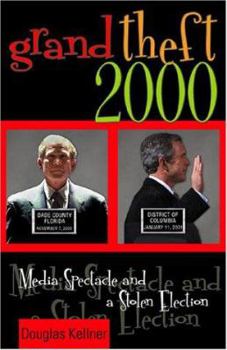Grand Theft 2000: Media Spectacle and a Stolen Election
Select Format
Select Condition 
Book Overview
The battle for the White House following the election of November 7, 2000 was arguably one of the major media spectacles in U.S. history, comparable to the Army-McCarthy hearings, the Kennedy assassination, the Watergate hearings, the Iran-Contra affair, the O.J. Simpson trial, and, most recently, the Clinton sex scandals and Impeachment trials. The election was in many ways more contained and circumscribed than these other epochal events, taking place over 36 days from the uncertainty of election night to Al Gore's concession on December 13 and George W. Bush's acceptance of the mantle of President-Elect. The story was highly theatrical with ups and downs, and surprises and reversals, for the candidates and the global audience, exhibiting unpredictability and uncertainty until the end. Its colorful cast of characters and melodramatic story line could hardly be bettered by the most creative Hollywood central casting. In Grand Theft 2000, Douglas Kellner recounts the story of a stolen election and Republican coup d'etat, focusing on the flaws of the system of democracy in the United States that allowed this event to take place. Kellner examines what the events of Election 2000 tell us about politics in the U.S. today and the alarming consequences for democracy in the battle for the White House. Grand Theft 2000 presents a historical narrative of the heist of the presidency as well as a critique of the media and political system that registers a crisis of democracy in the U.S.A. today. Arguing that the media are largely to blame for the theft of the presidency by the 'Bush machine, ' Kellner shows how failures of voting technology and literacy, Republican manipulation of the Florida electoral process and political system in the counting of the votes, and structural problems with the system of democracy in the United States reveals a crisis of democracy that requires radical measures. Concluding sections on 'Lesson and Conclusions' suggests some solutions to the problems revealed and a final section critically dissects the first 100 days of the Bush presidency
Format:Paperback
Language:English
ISBN:0742521036
ISBN13:9780742521032
Release Date:August 2001
Publisher:Rowman & Littlefield Publishers
Length:264 Pages
Weight:0.80 lbs.
Dimensions:0.6" x 5.9" x 8.9"
Customer Reviews
1 rating
AGAINST Publishers Weakly
Published by Thriftbooks.com User , 23 years ago
I write this review in direct opposition to the Publishers Weekly critique. ...Simply, Grand Theft 2000 is a political polemic from the Left that skewers #43, #41 and the entirety of their military-minded, big-business administrative cronies: Bush is flatly called an undeserving baby and images are presented of him sitting on daddy's knee as Son of Bush, both Bushes are the heirs of Nazi money, Cheney is a devious Machiavellian, Rumsfeld is a crazed racist who resembles Dr. Strangelove -- zig heil! Perhaps you have to be involved with high culture to understand what is truly interesting about this book: it is a set of theses nailed directly to the President's door...from a Philosophy chair at a major American university! A professional philosopher engaged up to his eyeballs in political pamphleteering? And we thought this only happened in Women's Studies. Of course, that Kellner manages to so clearly barbecue the new President with a vast amalgam of critical media facts, means that this polemic is doubly-informed as good scholarship and serves as an important historical document as well. Beyond, then, being a mere send-up of the Bushes, Grand Theft 2000 is also a powerful political text and an important counter-historical document that serves to critically inform the establishment myth even as it exposes that myth as media spectacle.Yes, it is true that no book can say everything and Grand Theft 2000 will not serve to supplant all of its competitors -- but does it intend to? Instead, this book is a rallying call to become better informed about the past election and its meaning for the present day. Grand Theft 2000 is as an encyclopedia of valuable progressive information on the election, including a number of Internet links, and in this respect alone it deserves to be thought of as one of the more useful books to have been published about the election.Finally, let me point out that this book has been much more favorably reviewed -- most recently by Salon -- and I submit this review now only because it deserves a better reputation than Publishers Weekly affords it. Thanks -- and hope this helps.





